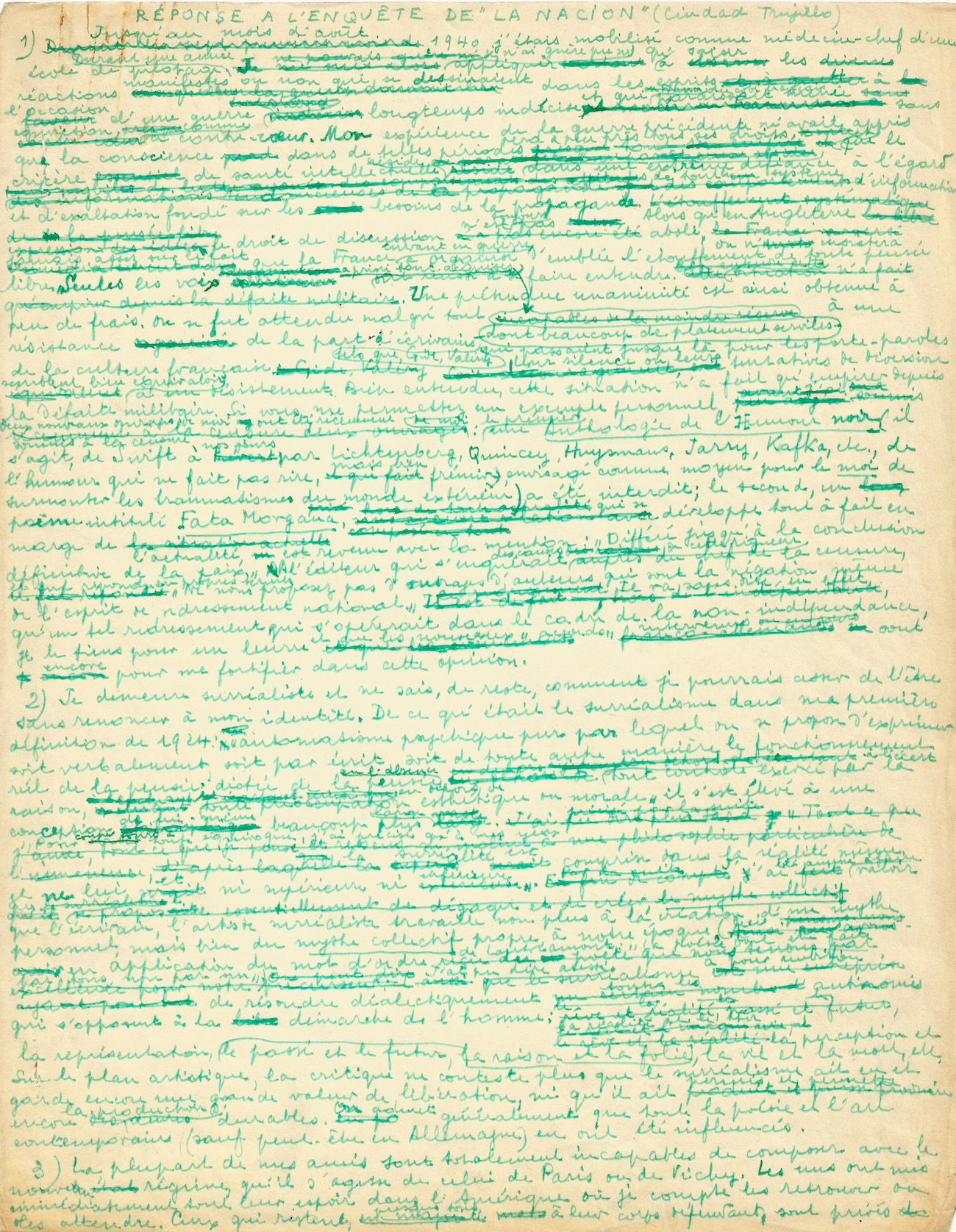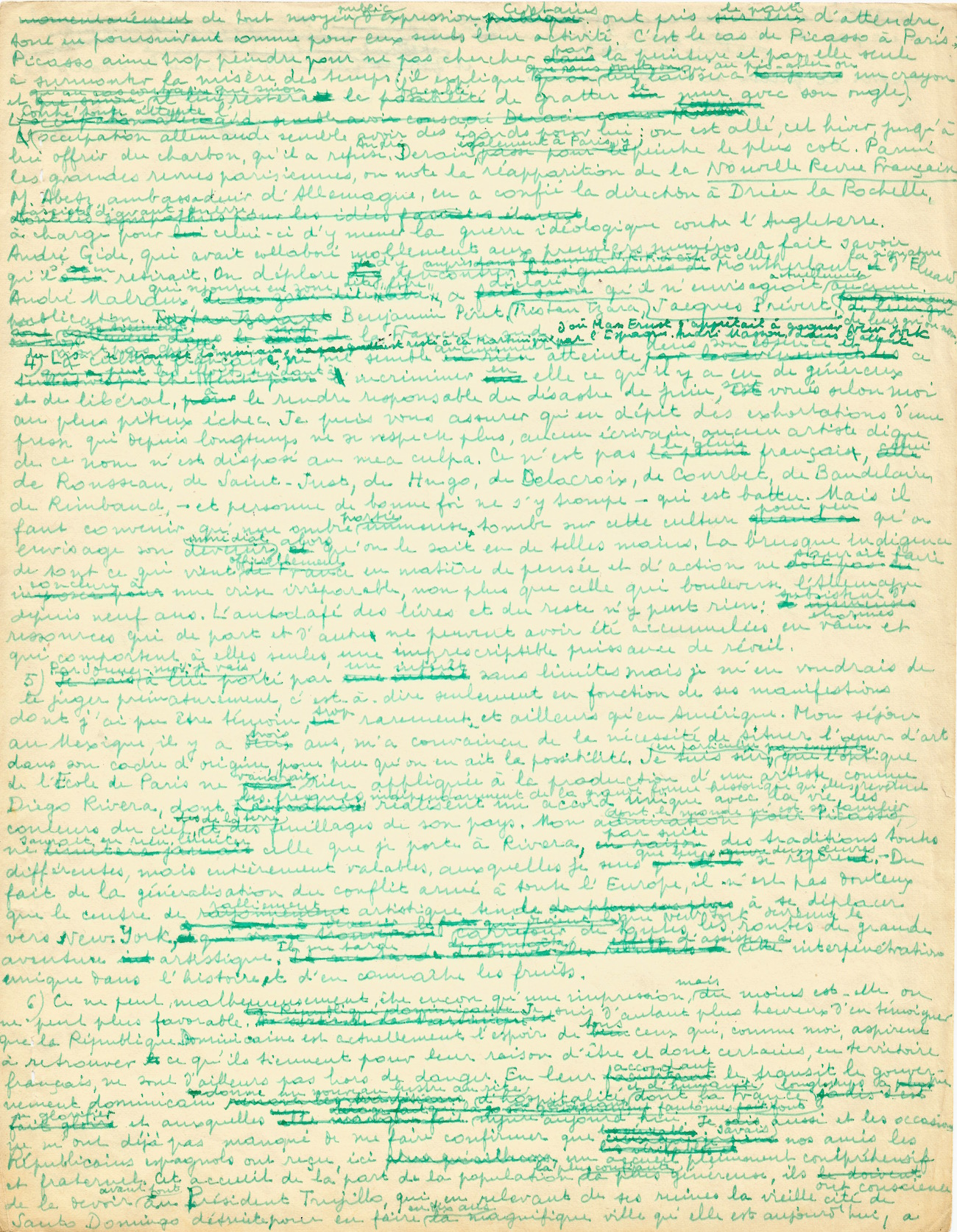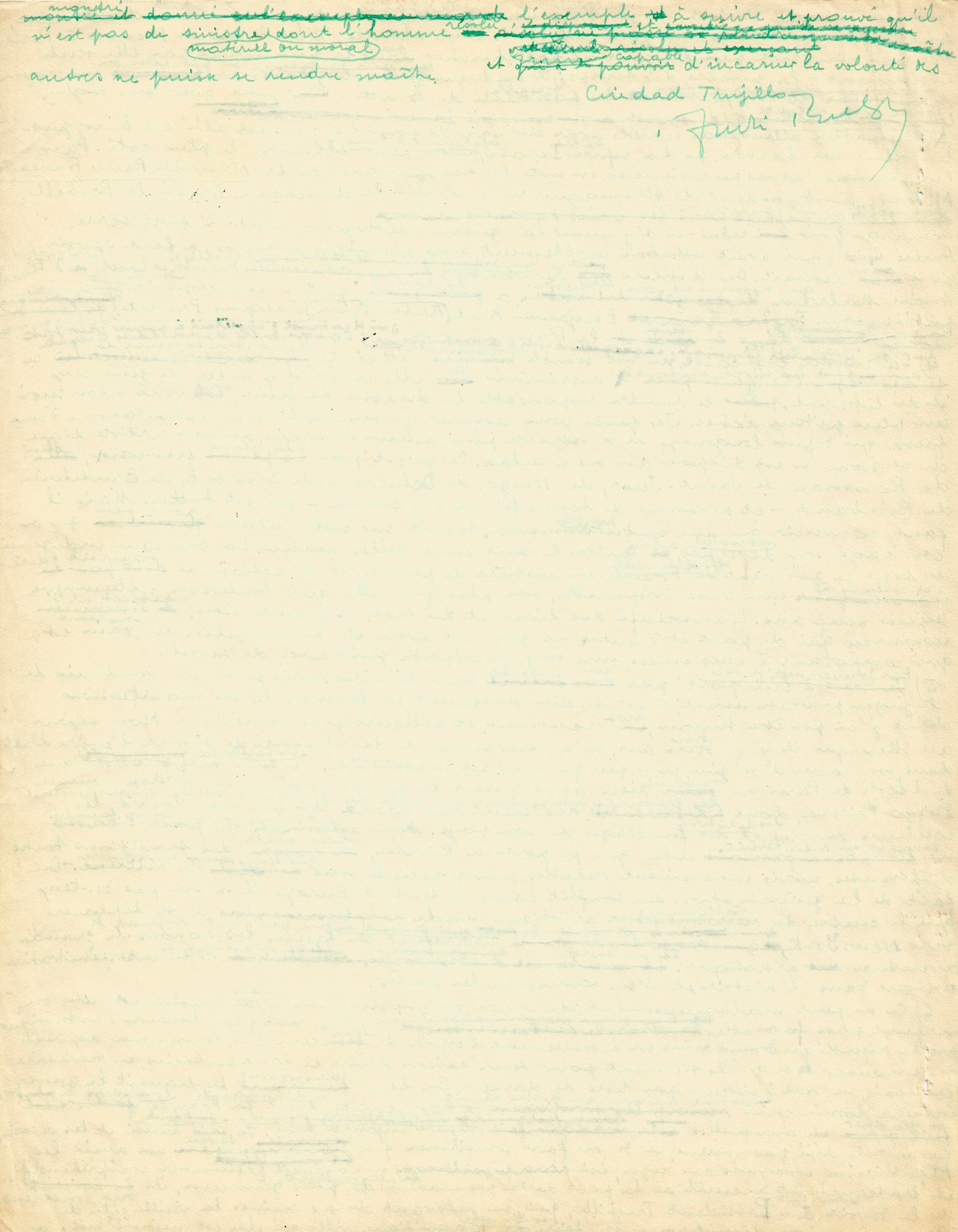André Breton (1896.1966).
Signed autograph manuscript.
Two pages ¼ in-4° in green ink. Ciudad Trujillo (May 1941).
“I remain a Surrealist and do not know, moreover, how I could stop being one without renouncing my identity. »
Important manuscript about the situation of the surrealist movement, and the artists who composed it, during the German occupation.
Breton analyzes the artistic situation resulting from the first years of war: Pablo Picasso took refuge in his art while Prévert, Tzara, Péret fought, and Max Ernst fled the country.
Evoking Surrealism, Breton does not fail to address a strong implicit criticism of Salvador Dali who claimed to embody the movement in his name alone.
He also testifies to his faith in the survival of French genius, citing Rousseau, Hugo, Delacroix, Baudelaire and Rimbaud, while prophesying an artistic migration to New York.
_________________________________________________
RESPONSE TO THE NACION INVESTIGATION (Ciudad Trujillo)
1) Until August 1940 I was mobilized as chief doctor of a flying school. For a year, I could hardly help but grasp the reactions, overt or not, which were taking shape in people's minds on the occasion of a war which had been indecisive for a long time and which seemed to be waged without conviction and against one's heart. My experience of the previous war had taught me that conscience in such periods loses almost all these rights. While in England the right of discussion is not abolished, we can never emphasize enough the fact that France entering the war immediately organized the stifling of all free thought (...) We had expected despite all to resistance on the part of writers such as Gide and Valéry who until then were seen as spokespersons for French culture. Their silence or their attempts at diversion seem to amount to a withdrawal. Of course this situation has only gotten worse since the military defeat. If you will allow me a personal example, two new works were recently submitted to censorship. The first: an Anthology of black humor (this is from Swift to the present day by Lichtenberg, Quincy, Huysmans, Jarry, Kafka, etc.; humor which does not make one laugh but rather shudder, envisaged as a means for the self to overcome the traumas of the outside world) was prohibited; the second, a poem entitled Fata Morgana, which develops completely on the fringes of current events, returned with the mention: “deferred until the definitive conclusion of peace”…..
2) I remain a Surrealist and do not know, moreover, how I could stop being one without renouncing my identity. Of what Surrealism was in my first definition of 1924: pure psychic automatism by which we propose to express either verbally, or in writing, or in any other way, the real functioning of thought dictated by thought outside of any control exercised by reason. Surrealism rose to a much broader conception of itself (…) Surreality is understood in reality itself, and is neither superior nor inferior to it. I was led to argue that the writer, the surrealist artist no longer works on the creation of a personal myth, but of the collective myth specific to our time, in application of Lautréamont's slogan : “Poetry must be done not by all, not by one. » I was also able to say that Surrealism aims to resolve dialectically all the antinomies which oppose man's approach: representation, the past and the future, reason and madness, life and death, etc. On the artistic level, criticism no longer disputes that Surrealism had and still retains a great liberating value (…) It is generally admitted that all contemporary poetry and Art (except perhaps in Germany) have been influenced by it. .
3) Most of my friends are completely incapable of dealing with the new regime, whether that of Paris or Vichy. Some immediately placed all their hopes in America where I intend to find them or wait for them. Those who remain, almost all of them unwillingly, are deprived of any public means of expression. Some have decided to wait while continuing their activity as if for themselves. This is the case of Picasso in Paris. Picasso loves painting too much not to seek through painting and through it alone to overcome the misery of the times. He explains that as a last resort we will leave him with a pencil and that otherwise he will still be able to scratch the wall with his fingernail. The German occupation seems to have respect for him . This winter we went so far as to offer him coal which he refused. André Derain, also in Paris, is considered the most popular painter. Among the major Parisian magazines, we note the reappearance of the Nouvelle Revue Française . Mr. Abetz, German ambassador, entrusted its management to Drieu La Rochelle, with the latter responsible for leading the ideological war against England. André Gide, who had collaborated sluggishly on the first issues, made it known that he was withdrawing. We regret to find there, alongside that of Montherlant, the signature of Éluard. André Malraux, who is staying in the so-called “free” zone, declared that he was not currently planning any publication. Benjamin Péret, Jacques Prévert, Tristan Tzara did not leave southern France, from where Max Ernst was preparing to reach New York.
4) French culture does not seem to me in any way affected in its essence (…) I can assure you that despite the exhortations of a press which has long no longer respected itself , no writer, no artist worthy of the name, is prepared to mea culpa. It is not the French genius, that of Rousseau, Saint-Just, Hugo, Delacroix, Courbet, Baudelaire, Rimbaud – and no one of good faith is mistaken – that is beaten . But we must admit that an immense shadow falls on this culture if we consider its immediate future, even though we know it is in such hands. The sudden indigence of everything that officially comes from France in terms of thought and action cannot lead us to conclude that there is an irreparable crisis, any more than the one that has been upsetting Germany for nine years. The burning of books and the rest can do nothing : there remain enormous resources which on both sides cannot have been accumulated in vain...
5) My stay in Mexico three years ago convinced me of the need to situate the work of art in its original setting, if possible. I am sure, in particular, that the optics of the School of Paris would be worth nothing applied to the production of an artist like Diego Rivera , whose frescoes, regardless of the great historical form they take, achieve a chord unique with life, the colors of the sky, the earth, and the foliage of his country. My admiration for Picasso cannot in any way limit my admiration for Rivera... Due to the generalization of the armed conflict throughout Europe, there is no doubt that the center of artistic rallying tends to move towards New York, that New York becomes the crossroads of all the roads of great artistic adventure. I look forward to witnessing this unique interpenetration in history and experiencing its fruits .
6) This can, unfortunately, still only be an impression, but at least it could not be more favorable. I am all the more happy to bear witness to this because the Dominican Republic is currently the hope of all those who, like me, aspire to rediscover what they hold for their reason for being and some of whom, in French territory, are also not out of danger (…) There is no disaster, material or moral, over which a resolute man capable of embodying the will of others cannot make himself master. »
_________________________________________________
André Breton left Marseille on March 24, 1941 heading for New York. On his way, he stopped in Martinique, Guadeloupe, then Ciudad Trujillo in the Dominican Republic, where he was questioned by the Spanish painter Fernandez Granell. The interview was published in the Dominican newspaper La Nacion on May 28, 1941.



